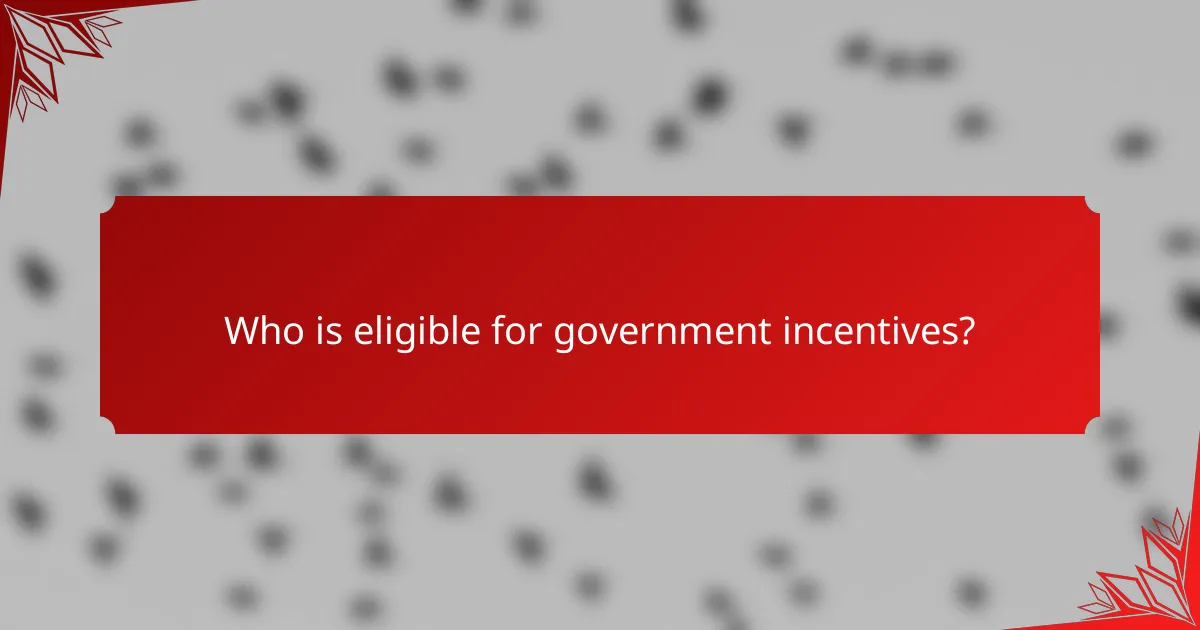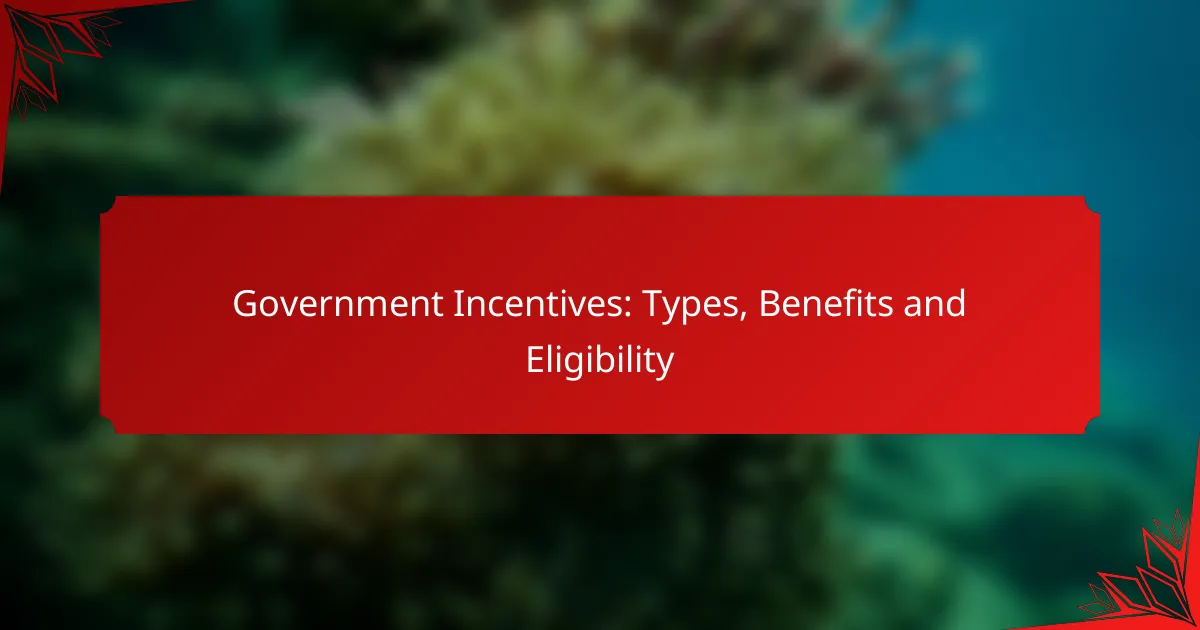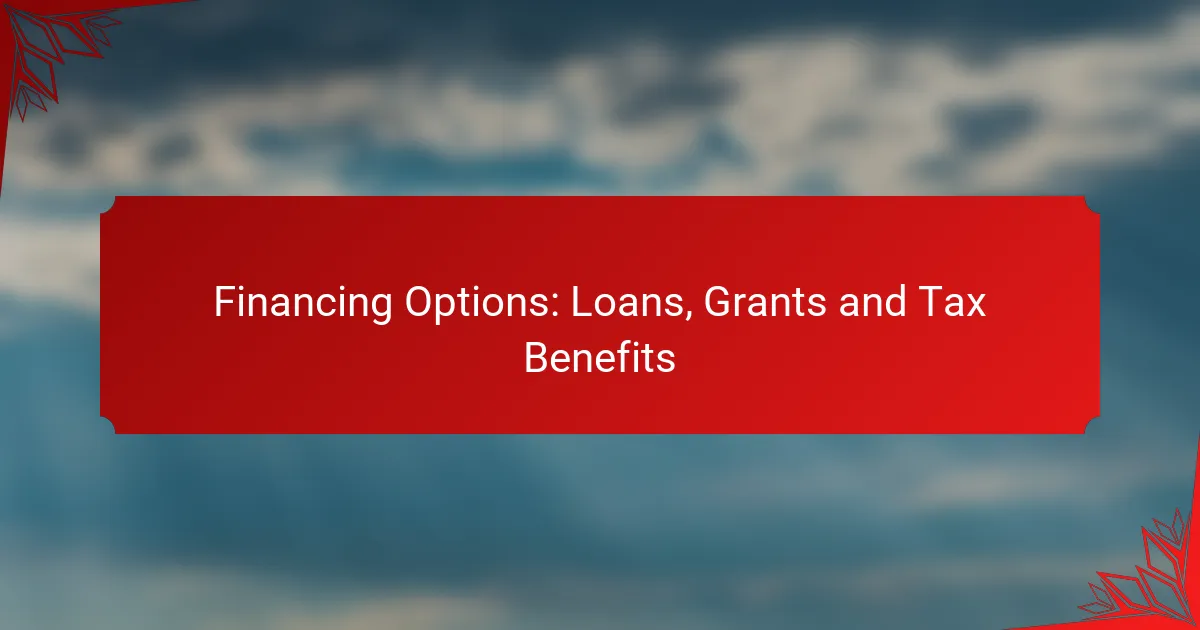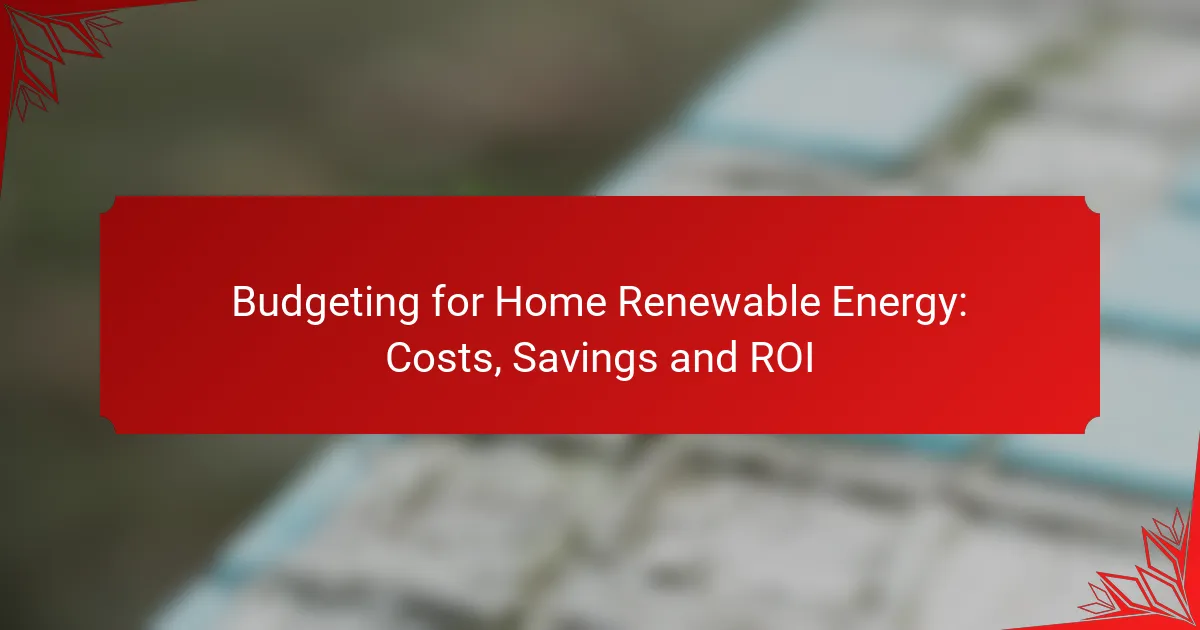The United States provides a range of government incentives aimed at fostering economic growth and supporting various sectors. These incentives, which include tax credits, grants, and loan programs, offer financial assistance and promote innovation, job creation, and overall economic development. Eligibility often varies by type and region, typically encompassing small businesses, non-profits, and startups, each with specific criteria to meet.

What types of government incentives are available in the United States?
The United States offers various government incentives designed to encourage economic growth, support businesses, and promote social welfare. These incentives include tax credits, grants, subsidies, loan programs, and investment tax incentives, each with specific eligibility criteria and benefits.
Tax credits
Tax credits reduce the amount of tax owed to the government, directly lowering tax liability. They can be refundable, allowing taxpayers to receive a refund if the credit exceeds the tax owed, or non-refundable, which only reduces tax liability to zero.
Common examples include the Earned Income Tax Credit (EITC) for low-income workers and the Child Tax Credit for families with children. Businesses can also benefit from credits for research and development or renewable energy investments.
Grants
Grants are funds provided by the government that do not need to be repaid, typically awarded for specific projects or purposes. They are often aimed at non-profit organizations, educational institutions, and small businesses to foster innovation or community development.
Examples include federal grants for scientific research or community development block grants. Applicants usually need to demonstrate how the funds will be used and meet specific eligibility criteria.
Subsidies
Subsidies are financial assistance programs that lower the cost of goods or services, making them more affordable for consumers or businesses. They are often used in sectors like agriculture, energy, and housing to promote stability and growth.
For instance, farmers may receive subsidies to support crop production, while renewable energy projects may benefit from government funding to reduce initial costs. Eligibility often depends on meeting certain production or income thresholds.
Loan programs
Loan programs provide financial assistance to individuals or businesses in the form of loans that must be repaid over time, often with favorable terms. These programs can help start or expand businesses, purchase homes, or finance education.
Examples include Small Business Administration (SBA) loans, which offer lower interest rates and longer repayment terms. Applicants typically need to provide a business plan and demonstrate the ability to repay the loan.
Investment tax incentives
Investment tax incentives encourage businesses to invest in specific assets or projects by providing tax benefits. These incentives can take the form of deductions or credits based on the amount invested in qualifying assets.
For example, businesses investing in renewable energy technologies may receive significant tax credits. Understanding the specific requirements and potential returns is crucial for maximizing these incentives.

What are the benefits of government incentives?
Government incentives provide various advantages, including financial assistance, support for innovation, job creation, and overall economic growth. These incentives help businesses thrive while contributing to the broader economy.
Financial support for businesses
Financial support through government incentives can come in the form of grants, loans, tax credits, or subsidies. These resources enable businesses to invest in new projects, expand operations, or improve cash flow without incurring significant debt.
For example, a small business might receive a grant to upgrade its technology, allowing it to operate more efficiently. This financial backing can be crucial, especially for startups or companies in economically challenging regions.
Encouragement of innovation
Government incentives often promote innovation by funding research and development (R&D) initiatives. This support encourages businesses to explore new technologies, products, or processes that can enhance their competitiveness.
Tax credits for R&D expenditures are a common form of incentive, allowing companies to deduct a portion of their innovation costs from their taxable income. This not only reduces their tax burden but also fosters a culture of creativity and advancement in the marketplace.
Job creation
Government incentives can lead to significant job creation as businesses expand and innovate. When companies receive financial support, they are more likely to hire additional staff to meet increased demand or to develop new products.
For instance, a manufacturing firm that receives a subsidy to increase production may need to hire more workers, directly contributing to local employment rates. This ripple effect can enhance community stability and prosperity.
Economic growth
By stimulating business activity, government incentives contribute to overall economic growth. Increased business investment leads to higher productivity, which can boost local and national economies.
Moreover, as businesses grow and create jobs, consumer spending typically rises, further driving economic expansion. Regions that effectively utilize government incentives often see a more robust economic landscape and improved quality of life for residents.

Who is eligible for government incentives?
Eligibility for government incentives typically includes small businesses, non-profit organizations, startups, and specific industries. Each category has its own criteria, often based on size, revenue, and purpose, which can vary by region and type of incentive.
Small businesses
Small businesses often qualify for various government incentives aimed at promoting growth and sustainability. These incentives can include grants, tax credits, and low-interest loans. To be eligible, businesses usually need to meet certain criteria, such as having a limited number of employees and annual revenue below a specified threshold.
For example, in the United States, a small business may be defined as having fewer than 500 employees, while in the EU, the limit can be as low as 50 employees for specific programs. Business owners should check local regulations to understand the exact requirements.
Non-profit organizations
Non-profit organizations can access government incentives designed to support their missions and community impact. These incentives may include grants, tax exemptions, and funding for specific projects. Eligibility often requires the organization to be registered as a non-profit and to demonstrate a clear public benefit.
In many cases, non-profits must provide detailed proposals outlining how the funds will be used and the expected outcomes. It’s essential for these organizations to maintain transparency and accountability to qualify for ongoing support.
Startups
Startups frequently qualify for government incentives aimed at fostering innovation and entrepreneurship. These incentives can include seed funding, tax breaks, and access to incubator programs. Eligibility criteria often focus on the age of the business, typically requiring it to be within a few years of establishment.
In some regions, startups may also need to demonstrate a scalable business model or technological innovation to qualify for specific incentives. Entrepreneurs should explore local startup accelerators and government programs for tailored support.
Specific industries
Certain industries may be prioritized for government incentives due to their economic significance or potential for job creation. Industries such as renewable energy, technology, and healthcare often receive targeted support through grants and tax incentives. Eligibility can depend on the industry’s alignment with government priorities and economic goals.
For instance, businesses in the renewable energy sector may qualify for substantial tax credits and grants aimed at reducing carbon emissions. Companies should research industry-specific programs and consult with local economic development offices to identify available incentives.

How to apply for government incentives?
Applying for government incentives involves a structured process that includes checking eligibility, gathering required documents, and submitting your application through the correct channels. Understanding these steps can significantly enhance your chances of receiving the benefits you seek.
Research eligibility criteria
Start by identifying the specific government incentives available in your region, as eligibility criteria can vary widely. Common factors include business size, industry type, and project scope. For instance, small businesses may qualify for grants or tax credits, while larger enterprises might be eligible for loans or investment incentives.
Visit official government websites or local economic development offices to find detailed information on the criteria. Make a checklist of requirements to ensure you meet all necessary conditions before proceeding with your application.
Prepare necessary documentation
Gathering the right documentation is crucial for a successful application. Typically, you will need to provide proof of eligibility, such as tax returns, business licenses, and financial statements. Depending on the incentive, additional documents like project proposals or impact assessments may also be required.
Organize your documents clearly and ensure they are up-to-date. Consider creating a digital folder for easy access and submission. This preparation can help avoid delays and increase your chances of approval.
Submit application through designated channels
Once your documentation is ready, submit your application through the designated channels, which may include online portals, mail, or in-person visits to government offices. Ensure you follow the specific submission guidelines provided for each incentive program.
Keep a copy of your application and any correspondence for your records. Follow up if you do not receive confirmation within a reasonable timeframe, as this can help you stay informed about the status of your application.

What are the prerequisites for accessing government incentives?
To access government incentives, businesses typically need to meet specific prerequisites that ensure eligibility. These often include proper business registration and compliance with local regulations.
Business registration
Proper business registration is essential for accessing government incentives. This process usually involves registering your business with the relevant state or local authorities, which may include obtaining a business license, tax identification number, and any necessary permits.
For example, in the United States, small businesses often register as LLCs or corporations, while in the European Union, businesses may need to comply with local company laws. Ensuring that your business is legally recognized can significantly enhance your chances of qualifying for available incentives.
Compliance with local regulations
Compliance with local regulations is crucial for businesses seeking government incentives. This includes adhering to zoning laws, environmental regulations, and labor standards that apply in your area. Non-compliance can lead to disqualification from incentive programs.
For instance, a business in Germany must follow strict environmental regulations to qualify for green energy incentives. Regular audits and staying informed about changes in local laws can help maintain compliance and ensure eligibility for various government programs.



